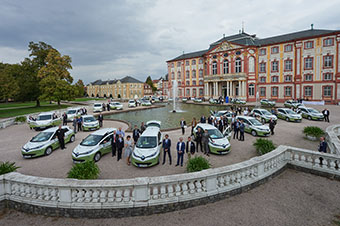To help reduce carbon emissions and relieve communities in the German region of Baden-Württemberg of traffic congestion, an EU-funded project has developed and deployed an electric car sharing network.
Electric car sharing programme in Germany cuts carbon footprint and traffic
- 08 January 2020
E-mobility is already attractive and suitable for everyday use by companies and citizens alike. In combination with car sharing, our European flagship project in Baden-Württemberg is setting a trend.
The EU-funded ‘Zeozweifrei unterwegs’ project established an integrated car sharing and electric mobility (e-mobility) system within the German economic region of Bruchsal, in the district of Karlsruhe. The effort is part of a nationwide strategy to reduce carbon emissions and traffic congestion by creating an interconnected system of green transport solutions.
As a result of this project, every city and municipality in the area now has at least one publicly-available charging station and one publicly-useable electric vehicle.
A public-private partnership
The project is a public-private partnership involving the regional business development board (responsible for management and location planning), the energy and water supply department (which provides the charging infrastructure), and the environment and energy agency (responsible for public relations and marketing). The individual electric vehicles are owned by the towns and cities they are stationed in.
Each of the project’s participating partners received a battery-powered vehicle that can be used by both the owner and the public via the car sharing scheme. This initiative serves as an example of how any electric vehicle owner can make their vehicle available to others via Zeozweifrei unterwegs.
With 40 electric vehicles available across 13 cities and communities, along with 40 rapid charging stations, Zeozweifrei unterwegs is well on the way to becoming the largest e-car sharing service outside a major city in Baden-Württemberg.
Driving down greenhouse gases
Five or seven seater vehicles are available, and a small van, which can be booked via the scheme’s website or hotline. Their locations appear on a map which updates in real-time, making it easy for users to locate the best vehicle for their needs with a smartphone, tablet or PC.
Each of the vehicles and charging points have a uniform design, meaning there are no surprises for customers when they collect or recharge a vehicle. Residents have a ‘familiar’ mobility option no matter where they are. Every vehicle is carbon-neutral because it is powered with 100 % green electricity.
The system already has over 2 000 active users, who have travelled nearly 1 million km using the scheme. This has resulted in a savings of 12 064 kg of CO2 per 100 000 km driven – a total of nearly 102 500 kg CO2 saved.
Total investment and EU funding
Total investment for the project “Zeozweifrei unterwegs” is EUR 2 004 344, with the EU’s European Regional Development Fund contributing EUR 999 005 through the “Baden-Württemberg” Operational Programme for the 2014-2020 programming period. The investment falls under the priority “Low carbon economy”.

